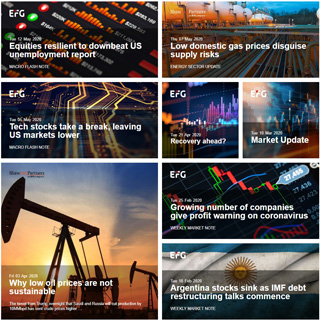
However last week the mounting concerns of a second wave knocked stocks off their gains, sliding for the week. Even Germany, a country which has been amongst those who have handled the pandemic the best, saw an outbreak at an abattoir over the previous weekend, once again putting meat processing in the spotlight. For the week the DAX index declined 2%. Aside from coronavirus news, Wirecard also grabbed attention as its financial scandal intensified. The German payment group acknowledged that the missing €1.9bn of cash on its balance sheet likely did not exist, later seeing its former CEO arrested and filing for insolvency at a Munich court on Thursday, the first DAX stock to go bust.
It wasn’t all doom and gloom in Europe though. There were signs of easing tensions between Germany’s constitutional court and the European Central Bank over the bond buying programme. The ECB published its minutes from its latest meeting, revealing that there was broad agreement that the positive side effects of the asset purchases had outweighed the negative effects. Flash PMI numbers also showed signs of recovery in the eurozone, with French manufacturing moving back into positive territory, although most other regions are still in contractionary territory.
Back at it again, the US threatened the European Union with new tariffs as part of its long-running spat over Airbus subsidies. Tariffs on 30 products worth over $3.1bn were being considered, although the EU warned that this would inflict damage on both sides. The Trump Administration’s America First campaign could pick up again as the US election heats up. Support for the President is waning so he is likely to do all he can to try and regain support. There were also suggestions of another “very generous” stimulus bill coming.
The US market swung between losses and gains but ended lower for the week as the US marked a new daily record of nearly 40,000 new infections on Thursday. Texas put some of its reopening plans on hold and this raises questions as to whether an economic recovery can be as fast as hoped. Wednesday and Friday were the roughest days for markets, where they saw losses of over 2%. Virus concerns pushed Treasury yields lower, as well as weighing on the investment grade corporate sector and credit spreads widened.
For the week the Nasdaq lost 1.9%, having snapped an eight-day winning streak on Wednesday. The Dow Jones and S&P 500 lost 3.3% and 2.9% respectively, with financials being particularly volatile. Bank stocks had rallied on news that restrictions that had been put in place following the financial crisis were being eased, lowering some margin requirements and allowing investments in riskier vehicles. However the following day financials lost ground after the Federal Reserve said it was restricting third quarter dividend payments and buybacks to protect the strength of banks.
Despite the rising virus cases many Asian equity markets ended the week marginally higher. The Nikkei gained 0.2%, with the yen little changed against the dollar. Meanwhile the Shanghai Composite was up 0.4%. The Chinese government announced it would increase the number of sectors open to foreign investment as it tries to seek support for its economy. In Latin America, coronavirus infections continue to rise at an alarming pace, dampening sentiment. In the IMF’s latest global output forecasts for 2020, Latin American economies saw some of the largest downgrades, with Brazil forecast to slump 9.1% and Argentina down 9.9%. The Brazilian real got a slight boost after the central bank said it saw little scope to cut rates much further
Read more articles
